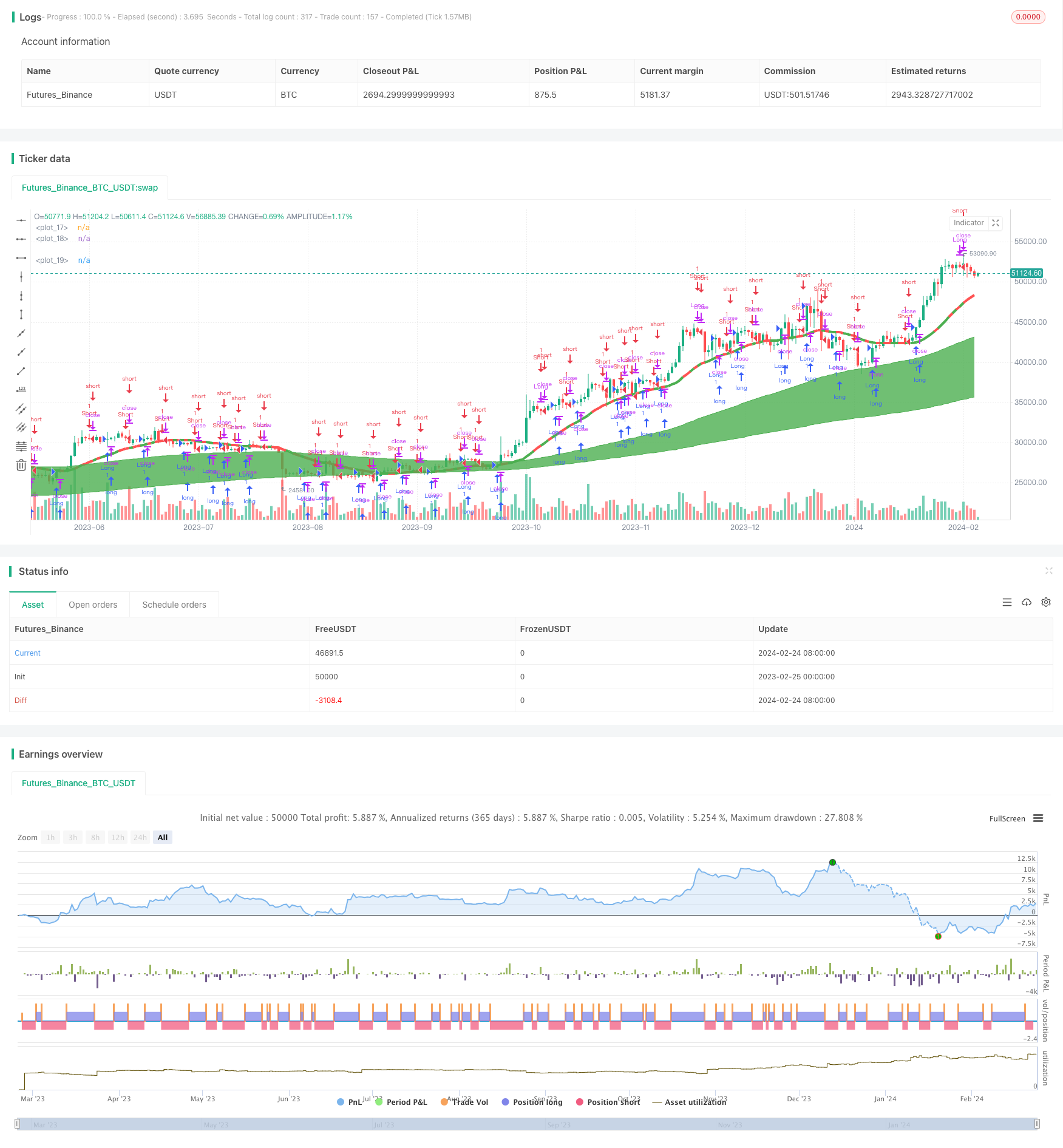Dual Moving Average HullMA Crossover Trend Strategy
Author: ChaoZhang, Date: 2024-02-26 11:21:45Tags:

Overview
The Dual Moving Average HullMA Crossover Trend strategy is a trend-following strategy based on the crossover of dual moving averages. It builds a dual moving average system using Weighted Moving Average (WMA) lines and generates trading signals when they cross over. The strategy also incorporates price breakout validation to further filter the signals.
Strategy Logic
The Dual Moving Average HullMA Crossover Trend strategy employs three WMA lines with different periods, including wma1, wma2, and wma3. The wma2 and wma3 construct the dual moving average system. The wma2 crossing above wma3 gives bullish signals, while the wma2 crossing below wma3 gives bearish signals. The wma1 serves as an auxiliary reference line.
Additionally, the strategy utilizes the Hull Moving Average to strengthen signal validation. Specifically, it calculates the difference between 2-period WMA doubled (n2ma) and n-period WMA (nma). Only when the difference rises will bull signals be confirmed valid. Only when the difference falls will bear signals be confirmed valid.
The strategy also incorporates price validation. Only when the price is higher than the previous day will bull signals be confirmed valid for long orders. Only when the price is lower than the previous day will bear signals be confirmed valid for short orders.
Advantage Analysis
The Dual Moving Average HullMA Crossover Trend strategy combines dual moving average crossover and price validation, which allows it to effectively filter out false signals. This is its biggest strength. Also, with three moving average lines of various periods, the strategy can capture trends of different levels early on. Its stop loss mechanism is quite stable and reliable as well.
Risk Analysis
As a trend-following strategy, the Dual Moving Average HullMA Crossover Trend strategy can generate relatively more trades and slippage costs during range-bound markets. Additionally, dual moving average crossover systems tend to be too sensitive and may emit incorrect signals during sideways trends. It is advisable to tune the moving average parameters or impose additional filters accordingly.
Optimization Directions
The Dual Moving Average HullMA Crossover Trend strategy can be improved in the following aspects:
Optimize the moving average parameters to find the best parameter combination
Add filters like volume or volatility to eliminate false breakouts
Incorporate other indicators as supplementary validation to improve signal quality
Dynamically optimize moving average period parameters
Summary
In summary, the Dual Moving Average HullMA Crossover Trend strategy is a stable and reliable trend-following strategy. It produces high-quality signals by combining dual moving average crossover and price validation. Through parameter tuning and adding filters, it can further reduce incorrect signals and achieve better performance. It is suitable for catching medium- to long-term trends and a solid choice for quantitative trading.
/*backtest
start: 2023-02-25 00:00:00
end: 2024-02-25 00:00:00
period: 1d
basePeriod: 1h
exchanges: [{"eid":"Futures_Binance","currency":"BTC_USDT"}]
*/
//@version=2
strategy("ZendicatoR", overlay=true)
dt = input(defval=0.0010, title="Decision Threshold", type=float, step=0.0001)
keh=input(title="Double HullMA Cross",defval=7, minval=1)
che1=input(title="MA 1",defval=34,minval=1)
che2=input(title="MA 2",defval=144,minval=1)
che3=input(title="MA 3",defval=377,minval=1)
amnt=input(title="TP ($)",defval=4200,minval=1)
wma1=wma(close,che1)
wma2=wma(close,che2)
wma3=wma(close,che3)
tms=10000000000000
A=request.security(syminfo.tickerid, 'D', close)*tms
B=request.security(syminfo.tickerid, 'D', close[1])*tms
C=A>B?green:red
D=wma2>wma3?green:red
plot(wma1,style=line,color=C,linewidth=4)
p1=plot(wma2,style=line,color=D)
p2=plot(wma3,style=line,color=D)
fill(p1, p2, color=D, transp=75)
n2ma=2*wma(close,round(keh/2))
nma=wma(close,keh)
diff=n2ma-nma,sqn=round(sqrt(keh))
n2ma1=2*wma(close[2],round(keh/2))
nma1=wma(close[2],keh)
diff1=n2ma1-nma1,sqn1=round(sqrt(keh))
n1=wma(diff,sqn)*tms
n2=wma(diff1,sqn)*tms
closelong = A*tms<B*tms and n2*tms>n1*tms and strategy.openprofit>amnt
if (closelong)
strategy.close("Long")
closeshort = A*tms>B*tms and n1*tms>n2*tms and strategy.openprofit>amnt
if (closeshort)
strategy.close("Short")
longCondition = A*tms>B*tms and n1*tms>n2*tms
if (longCondition)
strategy.entry("Long",strategy.long)
shortCondition = A*tms<B*tms and n1*tms<n2*tms
if (shortCondition)
strategy.entry("Short",strategy.short)
- Intelligent Accumulator Buy Strategy
- The Dual EMA Price Swing Strategy
- RSI Indicator Long Short Separation Trading Strategy
- Trend Following Quant Trading Strategy Based on Moving Average
- Inside Bar Breakout Strategy
- Gold Standard Quantitative Trading Strategy
- The Dual Reversal Strategy
- The Order Block Momentum Breakout Strategy
- Dual EMA Intelligent Tracking Strategy
- Moving Average Trading Strategy
- Dynamic Dual Moving Average Trailing Stop Strategy
- Moving Average Indicator Strategy
- Pivot Point SuperTrend Strategy
- Elliott Wave Strategy with 200 Day Moving Average
- Supertrend and CCI Scalping Strategy
- Supertrend and CCI Scalping Strategy
- Threefold Overlapping SuperTrend Strategy
- Trend Following Strategy Based on Moving Average Crossover
- Spaced Out Trading Strategy
- MoonFlag MACD Momentum StochRSI Trading Strategy